- Home
- P. G. Wodehouse
The Man Upstairs and Other Stories Page 9
The Man Upstairs and Other Stories Read online
Page 9
ARCHIBALD'S BENEFIT
Archibald Mealing was one of those golfers in whom desire outrunsperformance. Nobody could have been more willing than Archibald. Hetried, and tried hard. Every morning before he took his bath he wouldstand in front of his mirror and practise swings. Every night before hewent to bed he would read the golden words of some master on thesubject of putting, driving, or approaching. Yet on the links most ofhis time was spent in retrieving lost balls or replacing America.Whether it was that Archibald pressed too much or pressed too little,whether it was that his club deviated from the dotted line which joinedthe two points A and B in the illustrated plate of the man making thebrassy shot in the _Hints on Golf_ book, or whether it was that hewas pursued by some malignant fate, I do not know. Archibald ratherfavoured the last theory.
The important point is that, in his thirty-first year, after sixseasons of untiring effort, Archibald went in for a championship, andwon it.
Archibald, mark you, whose golf was a kind of blend of hockey, Swedishdrill, and buck-and-wing dancing.
I know the ordeal I must face when I make such a statement. I seeclearly before me the solid phalanx of men from Missouri, some urgingme to tell it to the King of Denmark, others insisting that I producemy Eskimos. Nevertheless, I do not shrink. I state once more that inhis thirty-first year Archibald Mealing went in for a golfchampionship, and won it.
* * * * *
Archibald belonged to a select little golf club, the members of whichlived and worked in New York, but played in Jersey. Men of substance,financially as well as physically, they had combined their superfluouscash and with it purchased a strip of land close to the sea. This landhad been drained--to the huge discomfort of a colony of mosquitoeswhich had come to look on the place as their private property--andconverted into links, which had become a sort of refuge for incompetentgolfers. The members of the Cape Pleasant Club were easygoing refugeesfrom other and more exacting clubs, men who pottered rather than racedround the links; men, in short, who had grown tired of having to stoptheir game and stand aside in order to allow perspiring experts to whizpast them. The Cape Pleasant golfers did not make themselves slaves tothe game. Their language, when they foozled, was gently regretfulrather than sulphurous. The moment in the day's play which they enjoyedmost was when they were saying: 'Well, here's luck!' in the club-house.
It will, therefore, be readily understood that Archibald's inability todo a hole in single figures did not handicap him at Cape Pleasant as itmight have done at St. Andrews. His kindly clubmates took him to theirbosoms to a man, and looked on him as a brother. Archibald's was one ofthose admirable natures which prompt their possessor frequently toremark: 'These are on me!' and his fellow golfers were not slow toappreciate the fact. They all loved Archibald.
Archibald was on the floor of his bedroom one afternoon, picking up thefragments of his mirror--a friend had advised him to practise theWalter J. Travis lofting shot--when the telephone bell rang. He took upthe receiver, and was hailed by the comfortable voice of McCay, theclub secretary.
'Is that Mealing?' asked McCay. 'Say, Archie, I'm putting your namedown for our championship competition. That's right, isn't it?'
'Sure,' said Archibald. 'When does it start?'
'Next Saturday.'
'That's me.'
'Good for you. Oh, Archie.'
'Hello?'
'A man I met today told me you were engaged. Is that a fact?'
'Sure,' murmured Archibald, blushfully.
The wire hummed with McCay's congratulations.
'Thanks,' said Archibald. 'Thanks, old man. What? Oh, yes. Milsom's hername. By the way, her family have taken a cottage at Cape Pleasant forthe summer. Some distance from the links. Yes, very convenient, isn'tit? Good-bye.'
He hung up the receiver and resumed his task of gathering up thefragments. Now McCay happened to be of a romantic and sentimentalnature. He was by profession a chartered accountant, and inclined to bestout; and all rather stout chartered accountants are sentimental.McCay was the sort of man who keeps old ball programmes and bundles ofletters tied round with lilac ribbon. At country houses, where theylingered in the porch after dinner to watch the moonlight flooding thequiet garden, it was McCay and his colleague who lingered longest.McCay knew Ella Wheeler Wilcox by heart, and could take Browningwithout anaesthetics. It is not to be wondered at, therefore, thatArchibald's remark about his fiancee coming to live at Cape Pleasantshould give him food for thought. It appealed to him.
He reflected on it a good deal during the day, and, running acrossSigsbee, a fellow Cape Pleasanter, after dinner that night at theSybarites' Club, he spoke of the matter to him. It so happened thatboth had dined excellently, and were looking on the world with a sortof cosy benevolence. They were in the mood when men pat small boys onthe head and ask them if they mean to be President when they grow up.
'I called up Archie Mealing today,' said McCay. 'Did you know he wasengaged?'
'I did hear something about it. Girl of the name of Wilson, or--'
'Milsom. She's going to spend the summer at Cape Pleasant, Archie tellsme.'
'Then she'll have a chance of seeing him play in the championshipcompetition.'
McCay sucked his cigar in silence for a while, watching with dreamyeyes the blue smoke as it curled ceiling-ward. When he spoke his voicewas singularly soft.
'Do you know, Sigsbee,' he said, sipping his Maraschino with a gentlemelancholy--'do you know, there is something wonderfully pathetic to mein this business. I see the whole thing so clearly. There was a kind ofquiver in the poor old chap's voice when he said: "She is coming toCape Pleasant," which told me more than any words could have done. Itis a tragedy in its way, Sigsbee. We may smile at it, think it trivial;but it is none the less a tragedy. That warm-hearted, enthusiasticgirl, all eagerness to see the man she loves do well--Archie, poor oldArchie, all on fire to prove to her that her trust in him is notmisplaced, and the end--Disillusionment--Disappointment--Unhappiness.'
'He ought to keep his eye on the ball,' said the more practicalSigsbee.
'Quite possibly,' continued McCay, 'he has told her that he will winthis championship.'
'If Archie's mutt enough to have told her that,' said Sigsbeedecidedly, 'he deserves all he gets. Waiter, two Scotch highballs.'
McCay was in no mood to subscribe to this stony-hearted view.
'I tell you,' he said, 'I'm _sorry_ for Archie! I'm _sorry_for the poor old chap. And I'm more than sorry for the girl.'
'Well, I don't see what we can do,' said Sigsbee. 'We can hardly beexpected to foozle on purpose, just to let Archie show off before hisgirl.'
McCay paused in the act of lighting his cigar, as one smitten with agreat thought.
'Why not?' he said. 'Why not, Sigsbee? Sigsbee, you've hit it.'
'Eh?'
'You have! I tell you, Sigsbee, you've solved the whole thing. Archie'ssuch a bully good fellow, why not give him a benefit? Why not let himwin this championship? You aren't going to tell me that you carewhether you win a tin medal or not?'
Sigsbee's benevolence was expanding under the influence of the Scotchhighball and his cigar. Little acts of kindness on Archie's part, herea cigar, there a lunch, at another time seats for the theatre, began torise to the surface of his memory like rainbow-coloured bubbles. Hewavered.
'Yes, but what about the rest of the men?' he said. 'There will be adozen or more in for the medal.'
'We can square them,' said McCay confidently. 'We will broach thematter to them at a series of dinners at which we will be joint hosts.They are white men who will be charmed to do a little thing like thatfor a sport like Archie.'
'How about Gossett?' said Sigsbee.
McCay's face clouded. Gossett was an unpopular subject with members ofthe Cape Pleasant Golf Club. He was the serpent in their Eden. Nobodyseemed quite to know how he had got in, but there, unfortunately, hewas. Gossett had introduced into Cape Pleasant golf a cheerlessatmosphere of the ri
gour of the game. It was to enable them to avoidjust such golfers as Gossett that the Cape Pleasanters had foundedtheir club. Genial courtesy rather than strict attention to the ruleshad been the leading characteristics of their play till his arrival. Upto that time it had been looked on as rather bad form to exact apenalty. A cheery give-and-take system had prevailed. Then Gossett hadcome, full of strange rules, and created about the same stir in thecommunity which a hawk would create in a gathering of middle-ageddoves.
'You can't square Gossett,' said Sigsbee.
McCay looked unhappy.
'I forgot him,' he said. 'Of course, nothing will stop him trying towin. I wish we could think of something. I would almost as soon see himlose as Archie win. But, after all, he does have off days sometimes.'
'You need to have a very off day to be as bad as Archie.'
They sat and smoked in silence.
'I've got it,' said Sigsbee suddenly. 'Gossett is a fine golfer, butnervous. If we upset his nerves enough, he will go right off hisstroke. Couldn't we think of some way?'
McCay reached out for his glass.
'Yours is a noble nature, Sigsbee,' he said.
'Oh, no,' said the paragon modestly. 'Have another cigar?'
* * * * *
In order that the render may get the mental half-Nelson on the plot ofthis narrative which is so essential if a short story is to charm,elevate, and instruct, it is necessary now, for the nonce (but only forthe nonce), to inspect Archibald's past life.
Archibald, as he had stated to McCay, was engaged to a MissMilsom--Miss Margaret Milsom. How few men, dear reader, are engaged togirls with _svelte_ figures, brown hair, and large blue eyes, nowsparkling and vivacious, now dreamy and soulful, but always large andblue! How few, I say. You are, dear reader, and so am I, but who else?Archibald was one of the few who happened to be.
He was happy. It is true that Margaret's mother was not, as it were,wrapped up in him. She exhibited none of that effervescent joy at hisappearance which we like to see in our mothers-in-law elect. On thecontrary, she generally cried bitterly whenever she saw him, and at theend of ten minutes was apt to retire sobbing to her room, where sheremained in a state of semi-coma till an advanced hour. She was by wayof being a confirmed invalid, and something about Archibald seemed toget right in among her nerve centres, reducing them for the time beingto a complicated hash. She did not like Archibald. She said she likedbig, manly men. Behind his back she not infrequently referred to him asa 'gaby'; sometimes even as that 'guffin'.
She did not do this to Margaret, for Margaret, besides being blue-eyed,was also a shade quick-tempered. Whenever she discussed Archibald, itwas with her son Stuyvesant. Stuyvesant Milsom, who thought Archibald abit of an ass, was always ready to sit and listen to his mother on thesubject, it being, however, an understood thing that at the conclusionof the seance she yielded one or two saffron-coloured bills towards hisracing debts. For Stuyvesant, having developed a habit of backinghorses which either did not start at all or else sat down and thoughtin the middle of the race, could always do with ten dollars or so. Hisprices for these interviews worked out, as a rule, at about three centsa word.
In these circumstances it was perhaps natural that Archibald andMargaret should prefer to meet, when they did meet, at some other spotthan the Milsom home. It suited them both better that they shouldarrange a secret tryst on these occasions. Archibald preferred itbecause being in the same room as Mrs Milsom always made him feel likea murderer with particularly large feet; and Margaret preferred itbecause, as she told Archibald, these secret meetings lent a touch ofpoetry to what might otherwise have been a commonplace engagement.
Archibald thought this charming; but at the same time he could notconceal from himself the fact that Margaret's passion for the poeticcut, so to speak, both ways. He admired and loved the loftiness of hersoul, but, on the other hand, it was a tough job having to live up toit. For Archibald was a very ordinary young man. They had tried toinoculate him with a love of poetry at school, but it had not taken.Until he was thirty he had been satisfied to class all poetry (exceptthat of Mr George Cohan) under the general heading of punk. Then he metMargaret, and the trouble began. On the day he first met her, at apicnic, she had looked so soulful, so aloof from this world, that hehad felt instinctively that here was a girl who expected more from aman than a mere statement that the weather was great. It so chancedthat he knew just one quotation from the classics, to wit, Tennyson'scritique of the Island-Valley of Avilion. He knew this because he hadhad the passage to write out one hundred and fifty times at school, onthe occasion of his being caught smoking by one of the faculty whohappened to be a passionate admirer of the 'Idylls of the King'.
A remark of Margaret's that it was a splendid day for a picnic and thatthe country looked nice gave him his opportunity.
'It reminds me,' he said, 'it reminds me strongly of the Island-Valleyof Avilion, where falls not hail, or rain, or any snow, nor ever windblows loudly; but it lies deep-meadow'd, happy, fair, with orchardlawns....'
He broke off here to squash a hornet; but Margaret had heard enough.'Are you fond of the poets, Mr Mealing?' she said, with a far-off look.
'Me?' said Archibald fervently. 'Me? Why, I eat 'em alive!'
* * * * *
And that was how all the trouble had started. It had meant unremittingtoil for Archibald. He felt that he had set himself a standard fromwhich he must not fall. He bought every new volume of poetry which waspraised in the press, and learned the reviews by heart. Every eveninghe read painfully a portion of the classics. He plodded through thepoetry sections of Bartlett's _Familiar Quotations_. Margaret'sdevotion to the various bards was so enthusiastic, and her reading sowide, that there were times when Archibald wondered if he could endurethe strain. But he persevered heroically, and so far had not been foundwanting. But the strain was fearful.
* * * * *
The early stages of the Cape Pleasant golf tournament need no detaileddescription. The rules of match play governed the contests, andArchibald disposed of his first three opponents before the twelfthhole. He had been diffident when he teed off with McCay in the firstround, but, finding that he defeated the secretary with ease, he metone Butler in the second round with more confidence. Butler, too, herouted; with the result that, by the time he faced Sigsbee in roundthree, he was practically the conquering hero. Fortune seemed to bebeaming upon him with almost insipid sweetness. When he was trapped inthe bunker at the seventh hole, Sigsbee became trapped as well. When hesliced at the sixth tee, Sigsbee pulled. And Archibald, striking abrilliant vein, did the next three holes in eleven, nine, and twelve;and, romping home, qualified for the final.
Gossett, that serpent, meanwhile, had beaten each of his threeopponents without much difficulty.
The final was fixed for the following Thursday morning. Gossett, whowas a broker, had made some frivolous objection about the difficulty ofabsenting himself from Wall Street, but had been overruled. WhenSigsbee pointed out that he could easily defeat Archibald and get tothe city by lunch-time if he wished, and that in any case his partnerwould be looking after things, he allowed himself to be persuaded,though reluctantly. It was a well-known fact that Gossett was in themidst of some rather sizeable deals at that time.
Thursday morning suited Archibald admirably. It had occurred to himthat he could bring off a double event. Margaret had arrived at CapePleasant on the previous evening, and he had arranged by telephone tomeet her at the end of the board-walk, which was about a mile from thelinks, at one o'clock, supply her with lunch, and spend the afternoonwith her on the water. If he started his match with Gossett ateleven-thirty, he would have plenty of time to have his game and be atthe end of the board-walk at the appointed hour. He had no delusionsabout the respective merits of Gossett and himself as golfers. He knewthat Gossett would win the necessary ten holes off the reel. It wassaddening, but it was a scientific fact. There was n
o avoiding it. Onesimply had to face it.
Having laid these plans, he caught the train on the Thursday morningwith the consoling feeling that, however sadly the morning might begin,it was bound to end well.
The day was fine, the sun warm, but tempered with a light breeze. Oneor two of the club had come to watch the match, among them Sigsbee.
Sigsbee drew Gossett aside.
'You must let me caddie for you, old man,' he said. 'I know yourtemperament so exactly. I know how little it takes to put you off yourstroke. In an ordinary game you might take one of these boys, I know,but on an important occasion like this you must not risk it. A grubbyboy, probably with a squint, would almost certainly get on yournerves. He might even make comments on the game, or whistle. But Iunderstand you. You must let me carry your clubs.'
'It's very good of you,' said Gossett.
'Not at all,' said Sigsbee.
* * * * *
Archibald was now preparing to drive off from the first tee. He didthis with great care. Everyone who has seen Archibald Mealing play golfknows that his teeing off is one of the most impressive sights everwitnessed on the links. He tilted his cap over his eyes, waggled hisclub a little, shifted his feet, waggled his club some more, gazedkeenly towards the horizon for a moment, waggled his club again, andfinally, with the air of a Strong Man lifting a bar of iron, raised itslowly above his head. Then, bringing it down with a sweep, he drovethe ball with a lofty slice some fifty yards. It was rarely that hefailed either to slice or pull his ball. His progress from hole to holewas generally a majestic zigzag.
Gossett's drive took him well on the way to the green. He holed out infive. Archibald, mournful but not surprised, made his way to the secondtee.
The second hole was shorter. Gossett won it in three. The third he tookin six, the fourth in four. Archibald began to feel that he might justas well not be there. He was practically a spectator.
At this point he reached in his pocket for his tobacco-pouch, toconsole himself with smoke. To his dismay he found it was not there. Hehad had it in the train, but now it had vanished. This added to hisgloom, for the pouch had been given to him by Margaret, and he hadalways thought it one more proof of the way her nature towered over thenatures of other girls that she had not woven a monogram on it inforget-me-nots. This record pouch was missing, and Archibald mournedfor the loss.
His sorrows were not alleviated by the fact that Gossett won the fifthand sixth holes.
It was now a quarter past twelve, and Archibald reflected with moodysatisfaction that the massacre must soon be over, and that he wouldthen be able to forget it in the society of Margaret.
As Gossett was about to drive off from the seventh tee, a telegraph boyapproached the little group.
'Mr Gossett,' he said.
Gossett lowered his driver, and wheeled round, but Sigsbee had snatchedthe envelope from the boy's hand.
'It's all right, old man,' he said. 'Go right ahead. I'll keep it safefor you.'
'Give it to me,' said Gossett anxiously. 'It may be from the office.Something may have happened to the market. I may be needed.'
'No, no,' said Sigsbee, soothingly. 'Don't you worry about it. Betternot open it. It might have something in it that would put you off yourstroke. Wait till the end of the game.'
'Give it to me. I want to see it.'
Sigsbee was firm.
'No,' he said. 'I'm here to see you win this championship and I won'thave you taking any risks. Besides, even if it was important, a fewminutes won't make any difference.'
'Well, at any rate, open it and read it.'
'It is probably in cipher,' said Sigsbee. 'I wouldn't understand it.Play on, old man. You've only a few more holes to win.'
Gossett turned and addressed his ball again. Then he swung. The clubtipped the ball, and it rolled sluggishly for a couple of feet.Archibald approached the tee. Now there were moments when Archibaldcould drive quite decently. He always applied a considerable amount ofmuscular force to his efforts. It was in that direction, as a rule, heerred. On this occasion, whether inspired by his rival's failure ormerely favoured by chance, he connected with his ball at precisely theright moment. It flew from the tee, straight, hard, and low, struck theground near the green, bounded on and finally rocked to within a footof the hole. No such long ball had been driven on the Cape Pleasantlinks since their foundation.
That it should have taken him three strokes to hole out from thispromising position was unfortunate, but not fatal, for Gossett, whoseemed suddenly to have fallen off his game, only reached the green inseven. A moment later a murmur of approval signified the fact thatArchibald had won his first hole.
'Mr Gossett,' said a voice.
Those murmuring approval observed that the telegraph boy was once morein their midst. This time he bore two missives. Sigsbee dexterouslyimpounded both.
'No,' he said with decision. 'I absolutely refuse to let you look atthem till the game is over. I know your temperament.'
Gossett gesticulated.
'But they must be important. They must come from my office. Where elsewould I get a stream of telegrams? Something has gone wrong. I amurgently needed.'
Sigsbee nodded gravely.
'That is what I fear,' he said. 'That is why I cannot risk having youupset. Time enough, Gossett, for bad news after the game. Play on, man,and dismiss it from your mind. Besides, you couldn't get back to NewYork just yet, in any case. There are no trains. Dismiss the wholething from your mind and just play your usual, and you're sure to win.'
Archibald had driven off during this conversation, but without hisprevious success. This time he had pulled his ball into some longgrass. Gossett's drive was, however, worse; and the subsequent movementof the pair to the hole resembled more than anything else themanoeuvres of two men rolling peanuts with toothpicks as the result ofan election bet. Archibald finally took the hole in twelve afterGossett had played his fourteenth.
When Archibald won the next in eleven and the tenth in nine, hope beganto flicker feebly in his bosom. But when he won two more holes,bringing the score to like-as-we-lie, it flamed up within him like abeacon.
The ordinary golfer, whose scores per hole seldom exceed those ofColonel Bogey, does not understand the whirl of mixed sensations whichthe really incompetent performer experiences on the rare occasions whenhe does strike a winning vein. As stroke follows stroke, and hecontinues to hold his opponent, a wild exhilaration surges through him,followed by a sort of awe, as if he were doing something wrong, evenirreligious. Then all these yeasty emotions subside and are blendedinto one glorious sensation of grandeur and majesty, as of a giantamong pygmies.
By the time that Archibald, putting with the care of one brushing fliesoff a sleeping Venus, had holed out and won the thirteenth, he was inthe full grip of this feeling. And as he walked to the fifteenth tee,after winning the fourteenth, he felt that this was Life, that till nowhe had been a mere mollusc.
Just at that moment he happened to look at his watch, and the sight waslike a douche of cold water. The hands stood at five minutes to one.
* * * * *
Let us pause and ponder on this point for a while. Let us not dismissit as if it were some mere trivial, everyday difficulty. You, dearreader, play an accurate, scientific game and beat your opponent withease every time you go the links, and so do I; but Archibald was notlike us. This was the first occasion on which he had ever felt that hewas playing well enough to give him a chance of defeating a really goodman. True, he had beaten McCay, Sigsbee, and Butler in the earlierrounds; but they were ignoble rivals compared with Gossett. To defeatGossett, however, meant the championship. On the other hand, he waspassionately devoted to Margaret Milsom, whom he was due to meet at theend of the board-walk at one sharp. It was now five minutes to one, andthe end of the board-walk still a mile away.
The mental struggle was brief but keen. A sharp pang, and his mind wasmade up. Cost what it might, he must stay o
n the links. If Margaretbroke off the engagement--well, it might be that Time would heal thewound, and that after many years he would find some other girl for whomhe might come to care in a wrecked, broken sort of way. But a chancelike this could never come again. What is Love compared with holing outbefore your opponent?
The excitement now had become so intense that a small boy, followingwith the crowd, swallowed his chewing-gum; for a slight improvement hadbecome noticeable in Gossett's play, and a slight improvement in theplay of almost anyone meant that it became vastly superior toArchibald's. At the next hole the improvement was not marked enough tohave its full effect, and Archibald contrived to halve. This made himtwo up and three to play. What the average golfer would consider acommanding lead. But Archibald was no average golfer. A commandinglead for him would have been two up and one to play.
To give the public of his best, your golfer should have his mind cooland intent upon the game. Inasmuch as Gossett was worrying about thetelegrams, while Archibald, strive as he might to dismiss it, washaunted by a vision of Margaret standing alone and deserted on theboard-walk, play became, as it were, ragged. Fine putting enabledGossett to do the sixteenth hole in twelve, and when, winning theseventeenth in nine, he brought his score level with Archibald's thematch seemed over. But just then--
'Mr Gossett!' said a familiar voice.
Once more was the much-enduring telegraph boy among those present.
'T'ree dis time!' he observed.
Gossett sprang, but again the watchful Sigsbee was too swift.
'Be brave, Gossett--be brave,' he said. 'This is a crisis in the game.Keep your nerve. Play just as if nothing existed outside the links. Tolook at these telegrams now would be fatal.'
Eye-witnesses of that great encounter will tell the story of the lasthole to their dying day. It was one of those Titanic struggles whichTime cannot efface from the memory. Archibald was fortunate in gettinga good start. He only missed twice before he struck his ball on thetee. Gossett had four strokes ere he achieved the feat. Nor didArchibald's luck desert him in the journey to the green. He was out ofthe bunker in eleven.
Gossett emerged only after sixteen. Finally, when Archibald'stwenty-first stroke sent the ball trickling into the hole, Gossetthad played his thirtieth.
The ball had hardly rested on the bottom of the hole before Gossett hadbegun to tear the telegrams from their envelopes. As he read, his eyesbulged in their sockets.
'Not bad news, I hope,' said a sympathetic bystander.
Sigsbee took the sheaf of telegrams.
The first ran: 'Good luck. Hope you win. McCay.' The second also ran:'Good luck. Hope you win. McCay.' So, singularly enough, did the third,fourth, fifth, sixth, and seventh.
'Great Scott!' said Sigsbee. 'He seems to have been pretty anxious notto run any risk of missing you, Gossett.'
As he spoke, Archibald, close beside him, was looking at his watch. Thehands stood at a quarter to two.
Margaret and her mother were seated in the parlour when Archibaldarrived. Mrs Milsom, who had elicited the fact that Archibald had notkept his appointment, had been saying 'I told you so' for some time,and this had not improved Margaret's temper. When, therefore,Archibald, damp and dishevelled, was shown in, the chill in the airnearly gave him frost-bite. Mrs Milsom did her celebrated imitation ofthe Gorgon, while Margaret, lightly humming an air, picked up a weeklypaper and became absorbed in it.
'Margaret, let me explain,' panted Archibald. Mrs Milsom was understoodto remark that she dared say. Margaret's attention was riveted by afashion plate.
'Driving in a taximeter to the ferry this morning,' resumed Archibald,'I had an accident.'
This was the result of some rather feverish brain-work on the way fromthe links to the cottage.
The periodical flopped to the floor.
'Oh, Archie, are you hurt?'
'A few scratches, nothing more; but it made me miss my train.'
'What train did you catch?' asked Mrs Milsom sepulchrally.
'The one o'clock. I came straight on here from the station.'
'Why,' said Margaret, 'Stuyvesant was coming home on the one o'clocktrain. Did you see him?'
Archibald's jaw dropped slightly.
'Er--no,' he said.
'How curious,' said Margaret.
'Very curious,' said Archibald.
'Most curious,' said Mrs Milsom.
They were still reflecting on the singularity of this fact when thedoor opened, and the son of the house entered in person.
'Thought I should find you here, Mealing,' he said. 'They gave me thisat the station to give to you; you dropped it this morning when you gotout of the train.'
He handed Archibald the missing pouch.
'Thanks,' said the latter huskily. 'When you say this morning, of courseyou mean this afternoon, but thanks all the same--thanks--thanks.'
'No, Archibald Mealing, he does _not_ mean this afternoon,' saidMrs Milsom. 'Stuyvesant, speak! From what train did that guf--did MrMealing alight when he dropped the tobacco-pouch?'
* * * * *
'The ten o'clock, the fellow told me. Said he would have given it backto him then only he sprinted off in the deuce of a hurry.'
Six eyes focused themselves upon Archibald.
'Margaret,' he said, 'I will not try to deceive you--'
'You may try,' observed Mrs Milsom, 'but you will not succeed.'
'Well, Archibald?'
Archibald fingered his collar.
'There was no taximeter accident.'
'Ah!' said Mrs Milsom.
'The fact is, I have been playing in a golf tournament.'
Margaret uttered an exclamation of surprise.
'Playing golf!'
Archibald bowed his head with manly resignation.
'Why didn't you tell me? Why didn't you arrange for us to meet on thelinks? I should have loved it.'
Archibald was amazed.
'You take an interest in golf, Margaret? You! I thought you scorned it,considered it an unintellectual game. I thought you considered allgames unintellectual.'
'Why, I play golf myself. Not very well.'
'Margaret! Why didn't you tell me?'
'I thought you might not like it. You were so spiritual, so poetic. Ifeared you would despise me.'
Archibald took a step forward. His voice was tense and trembling.
'Margaret,' he said, 'this is no time for misunderstandings. We must beopen with one another. Our happiness is at stake. Tell me honestly, doyou like poetry really?'
Margaret hesitated, then answered bravely:
'No, Archibald,' she said, 'it is as you suspect. I am not worthy ofyou. I do _not_ like poetry. Ah, you shudder! You turn away! Yourface grows hard and scornful!'
'I don't!' yelled Archibald. 'It doesn't! It doesn't do anything ofthe sort! You've made me another man!'
She stared, wild-eyed, astonished.
'What! Do you mean that you, too--'
'I should just say I do. I tell you I hate the beastly stuff. I onlypretended to like it because I thought you did. The hours I've spentlearning it up! I wonder I've not got brain fever.'
'Archie! Used you to read it up, too? Oh, if I'd only known!'
'And you forgive me--this morning, I mean?'
'Of course. You couldn't leave a golf tournament. By the way, how didyou get on?'
Archibald coughed.
'Rather well,' he said modestly. 'Pretty decently. In fact, not badly.As a matter of fact, I won the championship.'
'The championship!' whispered Margaret. 'Of America?'
'Well, not _absolutely_ of America,' said Archibald. 'But all thesame, a championship.'
'My hero.'
'You won't be wanting me for a while, I guess?' said Stuyvesantnonchalantly. 'Think I'll smoke a cigarette on the porch.'
And sobs from the stairs told that Mrs Milsom was already on her way toher room.

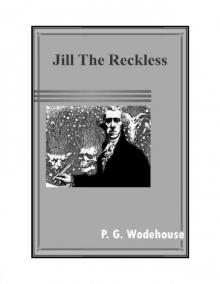 Jill the Reckless
Jill the Reckless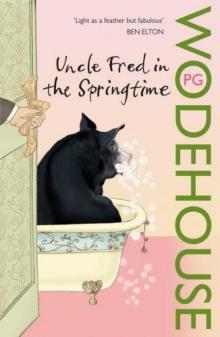 Uncle Fred in the Springtime
Uncle Fred in the Springtime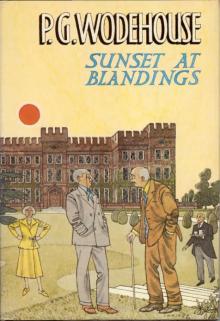 Sunset at Blandings
Sunset at Blandings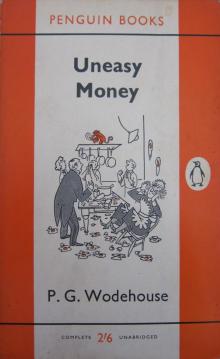 Uneasy Money
Uneasy Money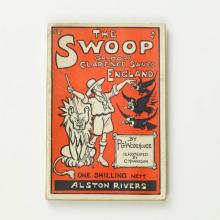 The Swoop! or, How Clarence Saved England: A Tale of the Great Invasion
The Swoop! or, How Clarence Saved England: A Tale of the Great Invasion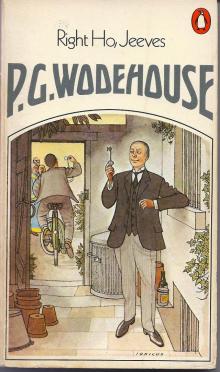 Right Ho, Jeeves
Right Ho, Jeeves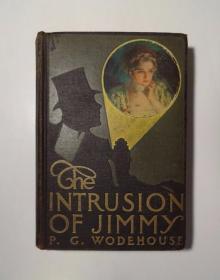 The Intrusion of Jimmy
The Intrusion of Jimmy The Jeeves Omnibus - Vol 1:
The Jeeves Omnibus - Vol 1: Aunts Aren't Gentlemen:
Aunts Aren't Gentlemen: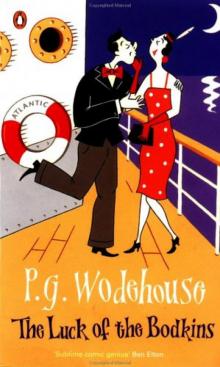 The Luck of the Bodkins
The Luck of the Bodkins The Little Nugget
The Little Nugget Money for Nothing
Money for Nothing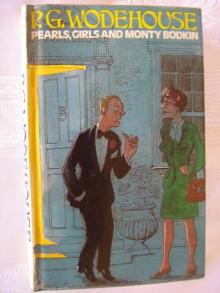 Pearls, Girls and Monty Bodkin
Pearls, Girls and Monty Bodkin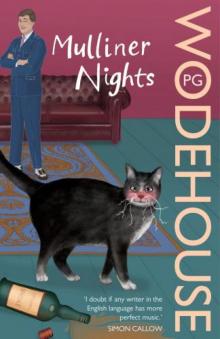 Mulliner Nights
Mulliner Nights Blandings Castle and Elsewhere
Blandings Castle and Elsewhere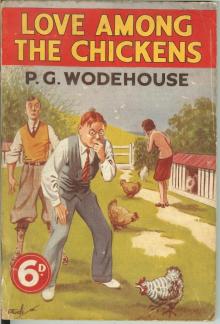 Love Among the Chickens
Love Among the Chickens Carry On, Jeeves!
Carry On, Jeeves!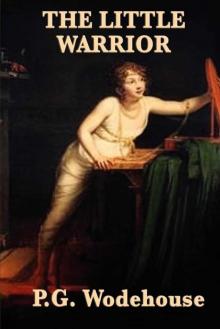 The Little Warrior
The Little Warrior Ice in the Bedroom
Ice in the Bedroom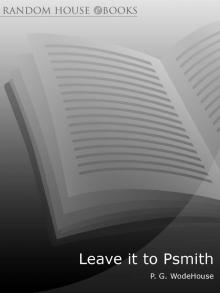 Leave It to Psmith
Leave It to Psmith Thank You, Jeeves:
Thank You, Jeeves: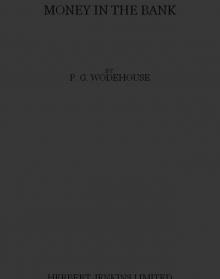 Money in the Bank
Money in the Bank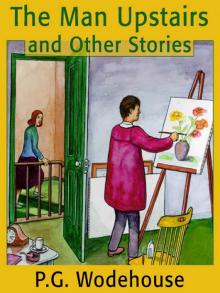 The Man Upstairs and Other Stories
The Man Upstairs and Other Stories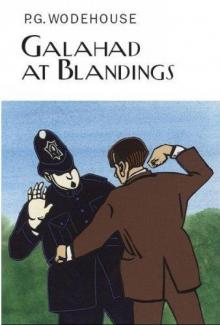 Galahad at Blandings
Galahad at Blandings The Jeeves Omnibus Vol. 5
The Jeeves Omnibus Vol. 5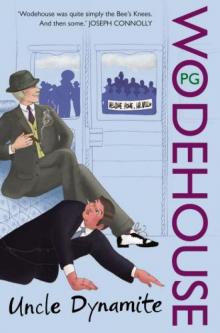 Uncle Dynamite
Uncle Dynamite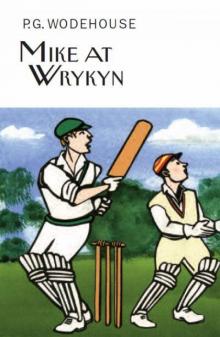 Mike at Wrykyn
Mike at Wrykyn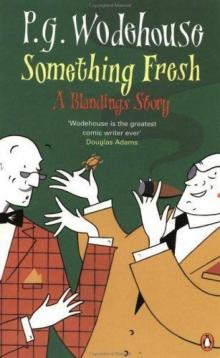 Something Fresh
Something Fresh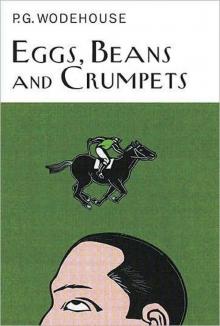 Eggs, Beans and Crumpets
Eggs, Beans and Crumpets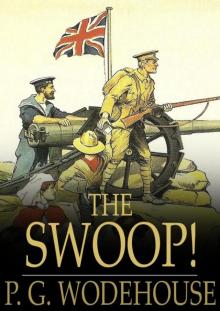 The Swoop: How Clarence Saved England (Forgotten Books)
The Swoop: How Clarence Saved England (Forgotten Books)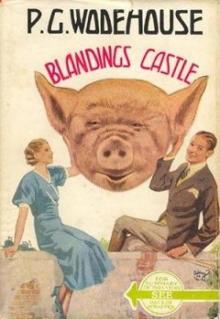 Blanding Castle Omnibus
Blanding Castle Omnibus Wodehouse at the Wicket: A Cricketing Anthology
Wodehouse at the Wicket: A Cricketing Anthology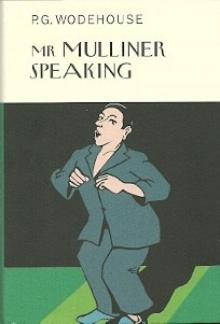 Mr. Mulliner Speaking
Mr. Mulliner Speaking Hot Water
Hot Water The Jeeves Omnibus - Vol 3: The Mating Season / Ring for Jeeves / Very Good, Jeeves
The Jeeves Omnibus - Vol 3: The Mating Season / Ring for Jeeves / Very Good, Jeeves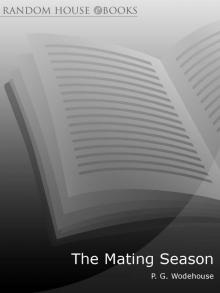 The Mating Season
The Mating Season Meet Mr. Mulliner
Meet Mr. Mulliner The Man with Two Left Feet, and Other Stories
The Man with Two Left Feet, and Other Stories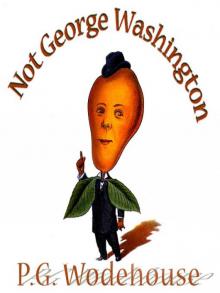 Not George Washington — an Autobiographical Novel
Not George Washington — an Autobiographical Novel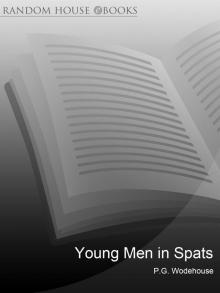 Young Men in Spats
Young Men in Spats The Jeeves Omnibus Vol. 4
The Jeeves Omnibus Vol. 4 A Pelican at Blandings:
A Pelican at Blandings: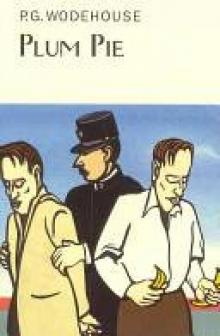 Plum Pie
Plum Pie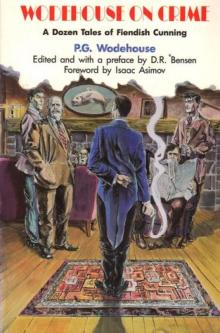 Wodehouse On Crime
Wodehouse On Crime The Jeeves Omnibus Vol. 2: Right Ho, Jeeves / Joy in the Morning / Carry On, Jeeves
The Jeeves Omnibus Vol. 2: Right Ho, Jeeves / Joy in the Morning / Carry On, Jeeves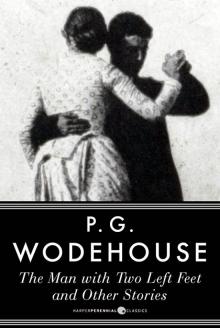 The Man With Two Left Feet
The Man With Two Left Feet Full Moon:
Full Moon: Jeeves and the Feudal Spirit:
Jeeves and the Feudal Spirit: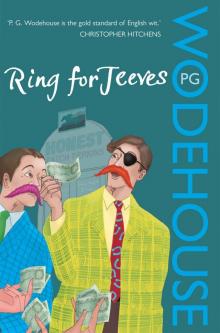 Ring For Jeeves
Ring For Jeeves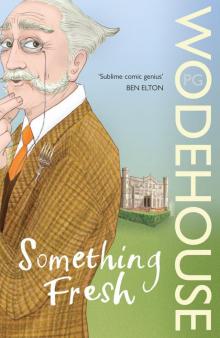 Something New
Something New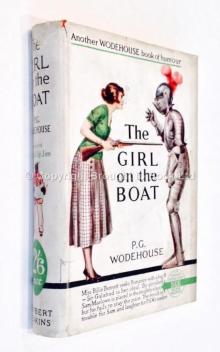 The Girl on the Boat
The Girl on the Boat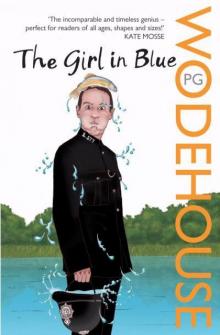 The Girl in Blue
The Girl in Blue Pigs Have Wings:
Pigs Have Wings: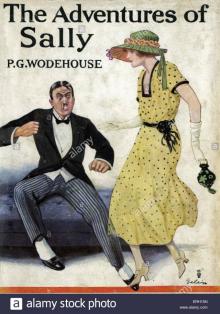 The Adventures of Sally
The Adventures of Sally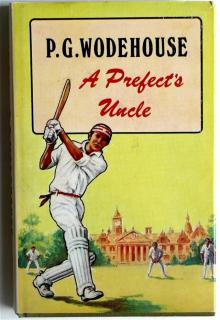 A Prefect's Uncle
A Prefect's Uncle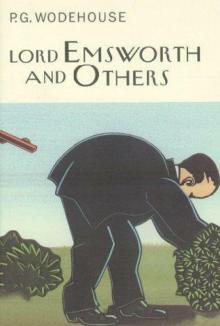 Lord Emsworth and Others
Lord Emsworth and Others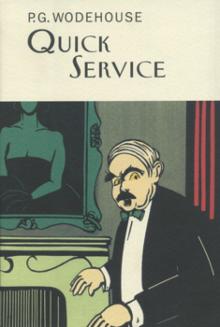 Quick Service
Quick Service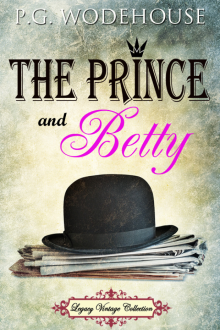 The Prince and Betty
The Prince and Betty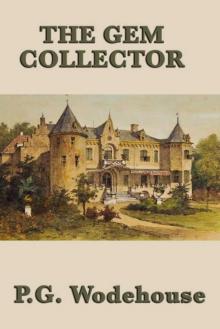 The Gem Collector
The Gem Collector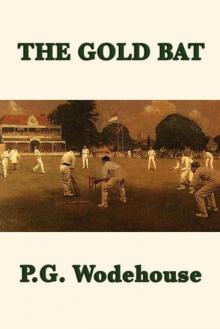 The Gold Bat
The Gold Bat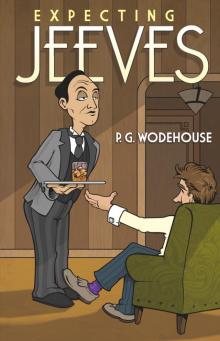 Expecting Jeeves
Expecting Jeeves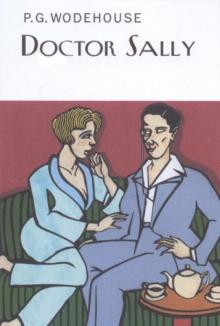 Doctor Sally
Doctor Sally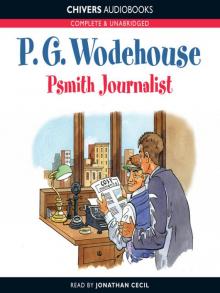 Psmith, Journalist
Psmith, Journalist The Golf Omnibus
The Golf Omnibus Heavy Weather
Heavy Weather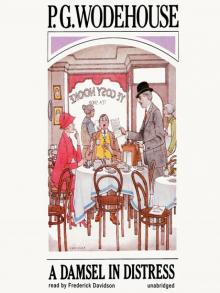 A Damsel in Distress
A Damsel in Distress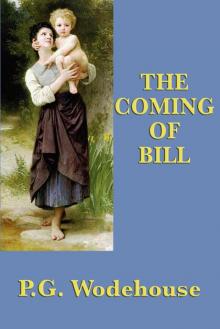 The Coming of Bill
The Coming of Bill Summer Lightning
Summer Lightning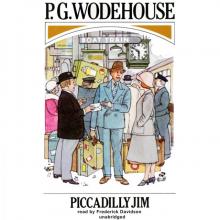 Piccadilly Jim
Piccadilly Jim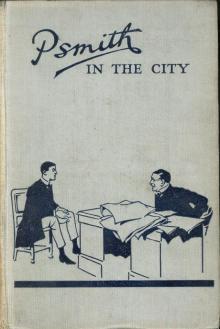 Psmith in the City
Psmith in the City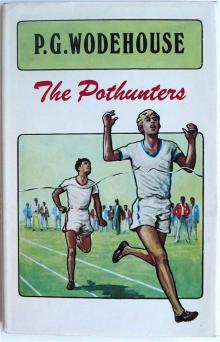 The Pothunters
The Pothunters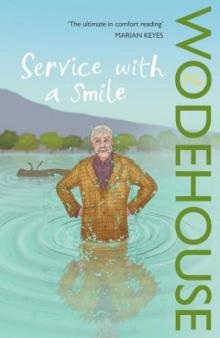 Service With a Smile
Service With a Smile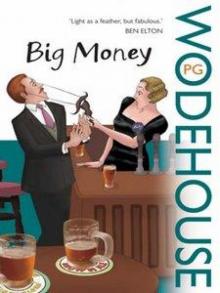 Big Money
Big Money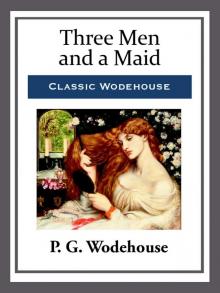 Three Men and a Maid
Three Men and a Maid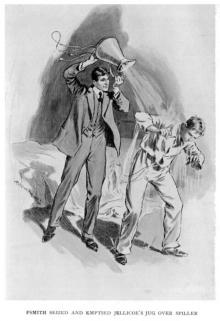 Mike and Psmith
Mike and Psmith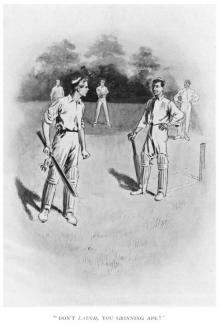 Mike
Mike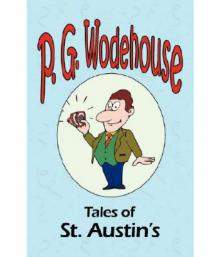 Tales of St. Austin's
Tales of St. Austin's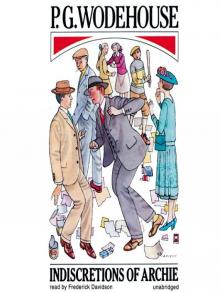 Indiscretions of Archie
Indiscretions of Archie Pigs Have Wings
Pigs Have Wings The Jeeves Omnibus - Vol 4: (Jeeves & Wooster): No.4
The Jeeves Omnibus - Vol 4: (Jeeves & Wooster): No.4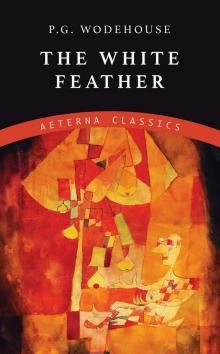 The White Feather
The White Feather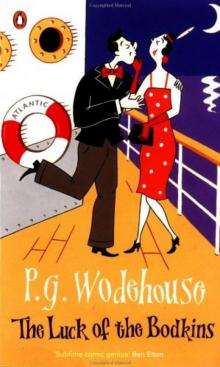 Luck of the Bodkins
Luck of the Bodkins THE SPRING SUIT
THE SPRING SUIT Full Moon
Full Moon Very Good, Jeeves
Very Good, Jeeves Thank You, Jeeves
Thank You, Jeeves Reginald's Record Knock.
Reginald's Record Knock. Wodehouse At the Wicket
Wodehouse At the Wicket LADIES AND GENTLEMEN V. PLAYERS
LADIES AND GENTLEMEN V. PLAYERS The Jeeves Omnibus - Vol 5: (Jeeves & Wooster)
The Jeeves Omnibus - Vol 5: (Jeeves & Wooster) The Jeeves Omnibus - Vol 1: (Jeeves & Wooster): No.1
The Jeeves Omnibus - Vol 1: (Jeeves & Wooster): No.1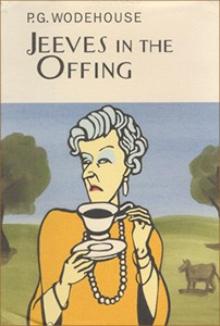 Jeeves in the offing jaw-12
Jeeves in the offing jaw-12